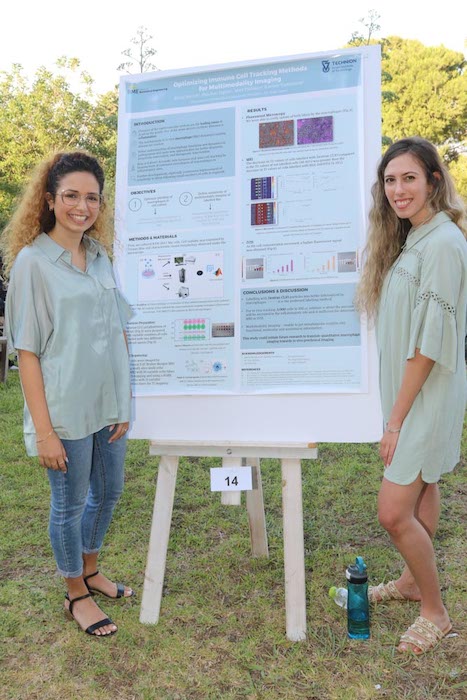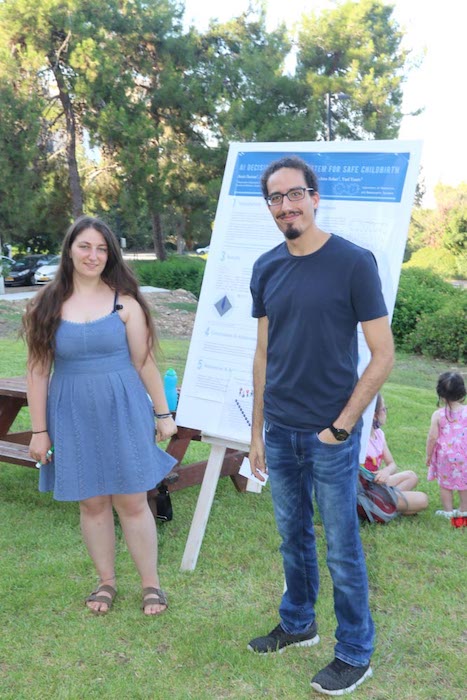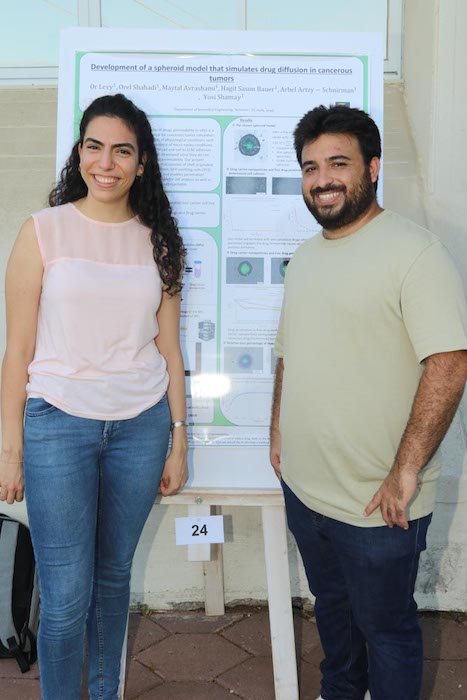Technion students don’t wait until graduation to make an impact on the world. Students from the Faculty of Biomedical Engineering recently showed off an array of initiatives from a tool that can detect cardiovascular disease to ingenious ways to fight COVID-19 — intriguing and lifesaving projects that could change the world.
First prize Winners Sivan Barash and Shachar Zigron
Early detection of cardiovascular disease
Sivan Barash and Shachar Zigron took first place in the student project competition, presenting a novel way of labelling macrophage cells that makes them detectable by MRI.
Macrophages are cells involved in the detection and destruction of bacteria. Recent studies have shown a link between inflammation in the body and cardiovascular disease. Since macrophage cells have a major role in inflammation, being able to observe their movement within the body would facilitate scientists’ exploration of the connection between inflammation and cardiovascular disease. The duo’s project has laid the groundwork for in-vivo studies soon to be conducted in the laboratory of Professor Katrien Vandoorne.
Second prize Winners Amit Parizat and Rotem Shapira
AI-based decision support machine for fetal monitoring
Second place went to Amit Parizat and Rotem Shapira, who created an artificial intelligence (AI) system to analyze the output of the fetal monitor during labor and serve as a decision support machine.
Complications during labor develop rapidly and can harm mother and child. The fetal monitor alerts healthcare providers of complications during labor. However, analyzing the monitor’s long signals manually is challenging and leads to obstetricians recommending Caesarean sections more often than is necessary.
Parizat and Shapira worked with the Obstetrics and Newborn Medicine Division at the Carmel Medical Center to prove the feasibility of training an AI machine to predict complications during childbirth, preventing unnecessary invasive intervention, while ensuring that intervention is performed when needed.
Third prize Winners Orel Shahadi and Or Levy
Treating cancer
Orel Shahadi and Or Levy, coming in third, developed a 3D model that simulates drug penetration into solid tumors, facilitating development of new drugs and drug combinations to treat cancer. Their innovative model features an inner cluster of cells engineered to display fluorescence, surrounded by an outer layer of cells. Change in the cells’ fluorescence served as an indicator, providing a way to measure drug penetration into the tumor with a high level of precision.
Detecting heart rhythm problems
Yonathan Belicha and Daniel Cherniavsky, who took fourth place, explored a novel approach to diagnosing cardiac arrhythmias (heart rhythm problems), using nothing more than a few one-minute videos of the patient — the kind of videos one might shoot on their smartphone.
The natural contraction and relaxation of the heart cause minute changes in the human skin color. Belicha and Cherniavsky extracted those very small changes from the videos, and from them, the subject’s pulse. Using this, they trained an AI system to recognize cardiac arrhythmia.
Fighting coronavirus with … ultrasound!
Finally, Mor Ventura, Dekel Brav, and Omri Magen, coming in fifth, tackled one of the challenges posed by the COVID-19 epidemic. Classification of the COVID-19 severity degree is usually done in hospitals using computerized tomography (CT) scans. However, CT machines’ availability is strained, they are expensive, and the process is further complicated by the need to transfer a patient with a highly contagious disease to and from the machine.
Ventura, Brav, and Magen explored the possibility of using lung ultrasound instead, obtaining the necessary diagnostic information faster and more easily at the patient’s bedside, and significantly reducing the workload in healthcare facilities. They first developed an image-processing algorithm to “read” and label lung ultrasounds, identifying areas of interest and ignoring artefacts. Using the results of this algorithm, the trio then trained a neural network to classify the ultrasound videos and identify the severity of the patient’s illness. The project was conducted in collaboration with the Tel Aviv Sourasky Medical Center.
Award-winning FemTech startup
Asaf Licht and Zeinat Awwad presented their wearable, continuous, and non-invasive tracker to monitor women’s hormonal levels. The device is aimed at easing the process of IVF, but also relevant for avoiding pregnancy, or alternatively for increasing the chances of getting pregnant.
Currently, IVF procedures require a blood test multiple times a week. Licht and Awwad’s tool, Harmony, seeks to replace that with an at-home device that provides continuous measurements while reducing discomfort. This project won first place in the EuroTech Innovation Day startup competition.
Going beyond the classroom
During project development, the students had to go through all the stages needed to bring an idea to fruition. Starting with a medical problem that needed to be addressed, the students had to combine and implement medical know-how with engineering skills and scientific knowledge in order to provide a real-world solution. This hands-on experience exposes and prepares Technion graduates to the high-tech and biomed industries, and to conduct biomedical research in a way that encourages multidisciplinary work. In short, such projects are vital for their future career and entrepreneurial skills.





